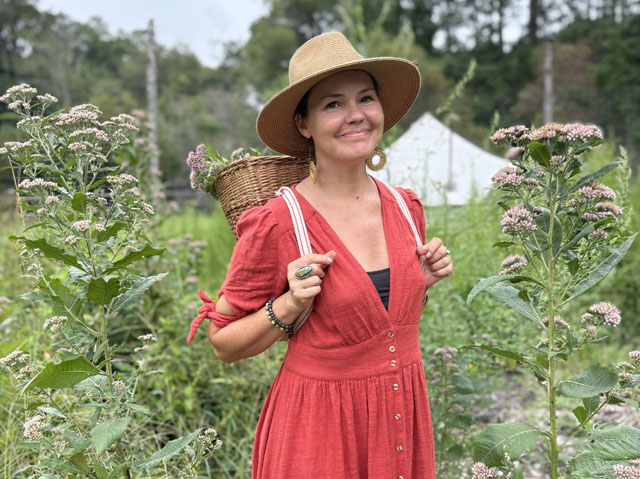Changing The Game
02 Jul 2023
After taking on embattled attorney Alex Murdaugh, Charleston attorney Ronnie Richter and his wife Robin have built a solid foundation that keeps them calm in the newfound spotlight
By Stinson Carter

The worldwide attention focused on the Murdaugh trial brought a new level of visibility to attorney Ronnie Richter. Together with partner Eric Bland, their firm represents the sons of Gloria Satterfield, the longtime Murdaugh family housekeeper killed in a mysterious accident; and Sandy Smith, whose son, Stephen, was also killed in mysterious circumstances.
For Richter, this is a continuation of the kind of legal work he’s been doing for decades. Being a lawyer who sues other lawyers is no easy road in South Carolina, a state crawling with attorneys—many of whom have power that isn’t just legal and financial, but also social and political.
But there’s another partnership at the heart of Ronnie Richter’s life that has kept him going through a career with many uncertain forks in the road: the one with his wife, Robin, over the past 26 years.
“We’ve never had attorney friends,” says Robin Richter. “So it’s funny now the way people will actually speak to us.”
“He has legitimized a pariah,” says Ronnie Richter of Alex Murdaugh, whose flagrant corruption has illustrated the importance of serious attorney-hunting attorneys. “There’s a new interest in what we do––and a new respect that didn’t exist before,” says Richter, though he’s the first to acknowledge that he’ll always be somewhat of a social outsider in the legal establishment because of the work that he does.
“We don’t go to the special parties and we’re not invited to the country estates,” he says.
Ronnie Richter is the son of a marine pipefitter. It’s the kind of biographical detail that could be played for effect, but this isn’t just blue-collar schtick. He’s lived the life to back it up.
He grew up in the Charleston suburb of James Island, and he still golfs at the Charleston Municipal Golf Course like he did as a kid. He and Robin have been married for 26 years. Both are graduates of the College of Charleston, and they met on a blind date in the Holy City. They’re both the first in their families to go to college, let alone law school, and they have a 21-year-old son in the US Navy who they raised on James Island, and who is currently in the Nuclear Propulsion training program in Goose Creek, SC.
The life they now lead was far from clear when they got married. Ronnie was working at a larger law firm when he decided to hang his own shingle in 1997.
“There is no firm today without Robin,” he says. At the time, she was working in Human Resources at Rogers & Brown Custom Brokers. The couple liquidated the $15,000 in Robin’s 401k account to buy furniture, two Dell computers and landline phones, and rented two commercial spaces from another lawyer for $500 per month.
“It was from absolute zero with no savings, no reserve, and no built-in client base, that we started this practice,” says Ronnie.
He started off taking any cases he could get, which led to a lot of domestic cases that wore him down emotionally. Eventually, fearing an imminent burnout from these domestic cases, he vowed to never take another. What would fill that void––and that income––was still unclear.
Career Turning Point
The career turning point for the kind of law that would define his career came in the early 2000s with a legal malpractice case involving a Charleston-area property developer named Jimmy Myrick. This is also when he officially teamed up with his current partner, Eric Bland, with whom Richter had worked earlier in his career.
“We had maintained a relationship, and he called one day to ask me about the Myrick Case,” says Richter.
Myrick had invested significantly in the development of Anchorage Plantation on Wadmalaw Island when he went into a technical default because of a bureaucratic delay in permit approvals. While Myrick was trying to navigate this crisis with his lawyers at the prominent Charleston firm, Nexsen Pruet, he found out that his property had been sold to a competing developer––and Nexsen Pruet had closed the deal. Despite how egregious this was, no one in the local legal community would help him.
“Jimmy had gone to law firm after law firm, and everyone had told him the same thing,” says Richter. “They said, ‘We don’t sue lawyers, it was too hot to touch, this is a powerful law firm, this is a closed community, I’m sorry.’ So, Jimmy called Eric, and Eric calls me,” says Richter.
The two were associating on other cases at the time, but were not yet partners.
“He had his firm, we had our firm, and it just struck us both the same way—that’s just wrong.” Richter remembers it as the nastiest litigation he’s ever been involved with.
“There was a sense of ‘How dare you,’” he recalls. “It reeked of arrogance and disrespect, and the more we sensed that, the more entrenched we got.”
Their victory in the case put attorneys across the state on notice, says Richter, that, “there’s two guys stupid enough to sue a firm like Nexsen Pruet in the state of South Carolina.”
Robin Richter remembers a lopsided dynamic where the bigger firm threw everything they had at her husband.
“When you think about these firms employing hundreds of attorneys and we have two attorneys, come on,” says Robin, “They almost laughed when we sued them for the first time––the second time, they didn’t laugh so much.”
“We ended up suing that firm five or six times,” says Ronnie, who was comfortable with the “outsider” status that came with the territory because he’d been experiencing it all his life.
“I always understood that there were segments of Charleston society that I just wasn’t a part of,” he says. “It was never a point of envy for me, it was just the reality. Now to enter the practice of law and experience the same thing, I was pretty well-conditioned to it because that’s what I grew up with.”
Murdaugh cases continue
Richter and Bland are still very much embroiled in the Murdaugh financial crimes as they relate to Gloria Satterfield’s sons, Tony and Brian. On behalf of Sandy Smith, who has been fighting for justice for her late son, Stephen, since his murder in 2015, they helped get his body exhumed for an additional autopsy. They met Sandy Smith during the course of working on the Satterfield case, and Ronnie says he felt that “there was always a sense that she got left behind.”
Adds Robin, “We just wanted to shine a light where we felt there was darkness.”
Working with the police is a one-way street for the firm, but they’re happy to support in any way they can.
“We give [law enforcement] information and they don’t share back, which is totally fine, I get that,” says Ronnie, who has shared everything they have found through the autopsy, their investigative work, and interviews. “But we do hear rumblings that they’re getting close to something.”
Ronnie and Robin Richter are taking the media attention in stride and keeping their focus where it’s always been––long before the news crews arrived. “It happened overnight for everybody else, but for us, this is our life,” says Robin, “We live it daily.”
“It feels a little bit like we’re the garage band that’s been banging out good music for 25 years and now we’re just suddenly discovered,” says Ronnie. Somewhat unexpectedly for him, he says he’s been approached by a number of attorneys who have thanked him for what he has exposed, and said they knew the state had problems with corruption, but it took lawyers like them and such a public case to finally ‘out’ it.
“I didn’t come here to make friends; I came here to practice law, and to do what I was taught to do at law school,” says Richter.
A Unique Perspective on Law
Richter often speaks to third-year law students about how to best make the transition from law school to law practice.
“I always tell them the same thing,” says Richter, “There’s three words that will set you free in this profession: ‘I don’t know.’ If you have the courage to look across the table and tell a client, ‘I don’t know,’ that’s a good way to start your practice and just carry that integrity forward. This idea that we should have the answers to all of the questions all of the time is very dangerous.”
Richter also believes in breaking down the barrier of “legalese” that attorneys don’t always use with the best intentions.
“We create our own language, I think, for the purpose of keeping people out of our world,” says Richter. “Any legal concept that we talk about is easily understandable if you just break it down.”
Robin agrees. “I think our clients have always appreciated that he’s brought it to everybody’s level. You don’t feel intimidated when you walk into this office.”
“I think it’s our obligation,” says Ronnie. “You shouldn’t feel intimidated, and if it’s someone you don’t like, you don’t trust, or you just wouldn’t want to have a beer with, then you should probably head for the exit because there’s plenty others out there.”
Ronnie and Robin have had a unique window onto South Carolina, if not America in general, over the past couple of decades. They have seen changes in society reflected in the world of law. Ronnie has seen the atmosphere change dramatically since he first started out, and a shift to an angrier and more contentious workplace like he’s never seen before. Not just with attorneys, but also with clients.
“I think we pick up some of the energy of our clients, and clients are very keen for the fight right now and not very keen on resolution,” says Ronnie. “We are at our best when we’re solving problems, not when we’re fueling them. But there’s a lot of money to be made fueling problems.” Despite everything, he still believes in the integrity of his profession. “It’s not popular,” says Richter, “but most lawyers are pretty decent people, even in the context of what we do.”
A Perfect Match
Robin left the HR world years ago and is now the CFO of the firm. The walls of the firm conference room are covered with framed and signed Broadway musical posters. A sign that the life they lead isn’t all dirty lawyers and scandal.
“We definitely can turn it off at the end of the day, which you have to do, to remain in love,” says Robin.
At the end of our interview, Robin looks at Ronnie as if something is on the tip of her tongue, but she’s not sure if she’s going to bring it up.
“He gave me his kidney,” she says, “so I carry a part of him with me all the time.”
Robin has had polycystic kidney disease since childhood. When she was sixteen, she went septic, nearly died, and lost most of one of her kidneys.
“This was a can we were kicking down the road for our entire marriage,” says Ronnie. In 2014, she reached what they describe as an “end stage,” and was put on the donor list. Ronnie entered a donor program with her, so he could cross match with another donor recipient pair somewhere across the country.
“It broadens the net, because the likelihood that you can find a living donor that matches you is so remote,” he says.
Around Christmastime of that year, Ronnie wrote an email to a coordinator of the donor program to say that he wanted to give Robin something special this year beyond jewelry and perfume. The email he got back stunned him.
“She emails back and says, ‘You’re not going to believe this, but you’re a perfect match for your wife,” says Ronnie, a fact that defied staggering odds. She was just about to start dialysis, and the two were in surgery a month later. “I told her I’ll either just be under your skin,” says Ronnie, “or we’ll be closer than ever.”
Asked if they’d ever leave Charleston, Robin is quick to reply: “He’ll never leave James Island, and I’ll never leave him.”
Like the ‘legalese’ that Richter rails against, it’s all pretty simple if you break it down.












